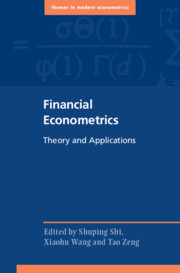Book contents
- Frontmatter
- Contents
- List of Contributors
- Foreword
- Acknowledgments
- Part I Trend Determination, Asset Price Bubbles, and Factor-Augmented Regressions
- Part II Continuous-Time Models and High-Frequency Financial Econometrics
- Part III Bayesian Estimation and Inferences
- 9 Methods for Estimating Discrete-Time Stochastic Volatility Models
- 10 Hypothesis Testing Statistics Based on Posterior Output with Applications in Financial Econometrics
- 11 Posterior-Based Specification Testing and Model Selection
- Index
11 - Posterior-Based Specification Testing and Model Selection
from Part III - Bayesian Estimation and Inferences
Published online by Cambridge University Press: 20 February 2025
- Frontmatter
- Contents
- List of Contributors
- Foreword
- Acknowledgments
- Part I Trend Determination, Asset Price Bubbles, and Factor-Augmented Regressions
- Part II Continuous-Time Models and High-Frequency Financial Econometrics
- Part III Bayesian Estimation and Inferences
- 9 Methods for Estimating Discrete-Time Stochastic Volatility Models
- 10 Hypothesis Testing Statistics Based on Posterior Output with Applications in Financial Econometrics
- 11 Posterior-Based Specification Testing and Model Selection
- Index
Summary
This chapter provides an overview of posterior-based specification testing methods and model selection criteria that have been developed in recent years. For the specification testing methods, the first method is the posterior-based version of IOSA test. The second method is motivated by the power enhancement technique. For the model selection criteria, we first review the deviance information criterion (DIC). We discuss its asymptotic justification and shed light on the circumstances in which DIC fails to work. One practically relevant circumstance is when there are latent variables that are treated as parameters. Another important circumstance is when the candidate model is misspecified. We then review DICL for latent variable models and DICM for misspecified models.
Keywords
Information
- Type
- Chapter
- Information
- Financial EconometricsTheory and Applications, pp. 340 - 377Publisher: Cambridge University PressPrint publication year: 2025
